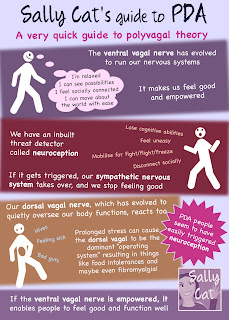A Quick Guide to Internalised PDA

Introduction Pathological Demand Avoidance (PDA) research has solely focused on its external manifestations, neglecting those of us who internalise our stresses. Internalised PDA tends to go unnoticed. Our meltdowns are concealed and our demand avoidance is carried out subtly, so that we slip under the radar. However, it’s crucial to recognise that internalised PDA isn’t “less” than externalised PDA; like an iceberg, much of our experience is hidden beneath the surface. The Hidden Struggles of Internalisers The driving forces behind internalised PDA are as intense as those experienced by externalisers. This often leads to severe consequences, such as self-harm, school or work dropout, and even suicidal thoughts. It’s essential to spotlight the internalised aspects of PDA, as our ability to mask and conceal our traits results in a lack of understanding from those around us. A Guided Tour Through Internalised PDA This article invites you to explore the lesser-known aspects of PDA, partic...
